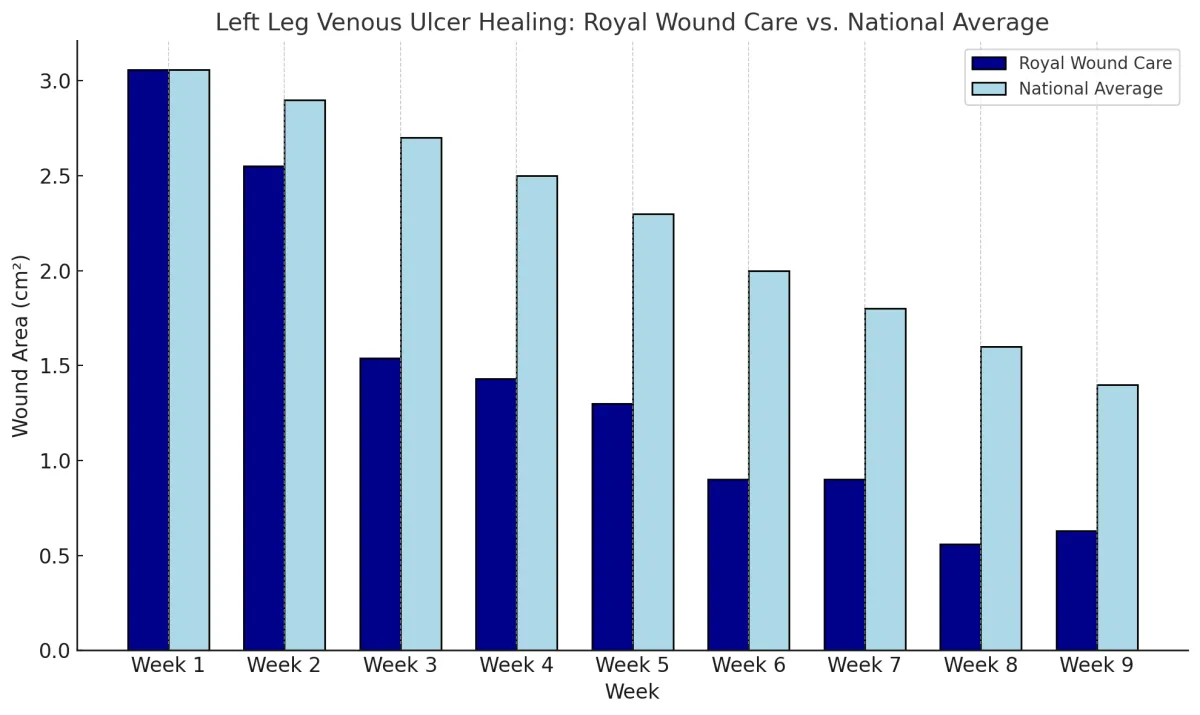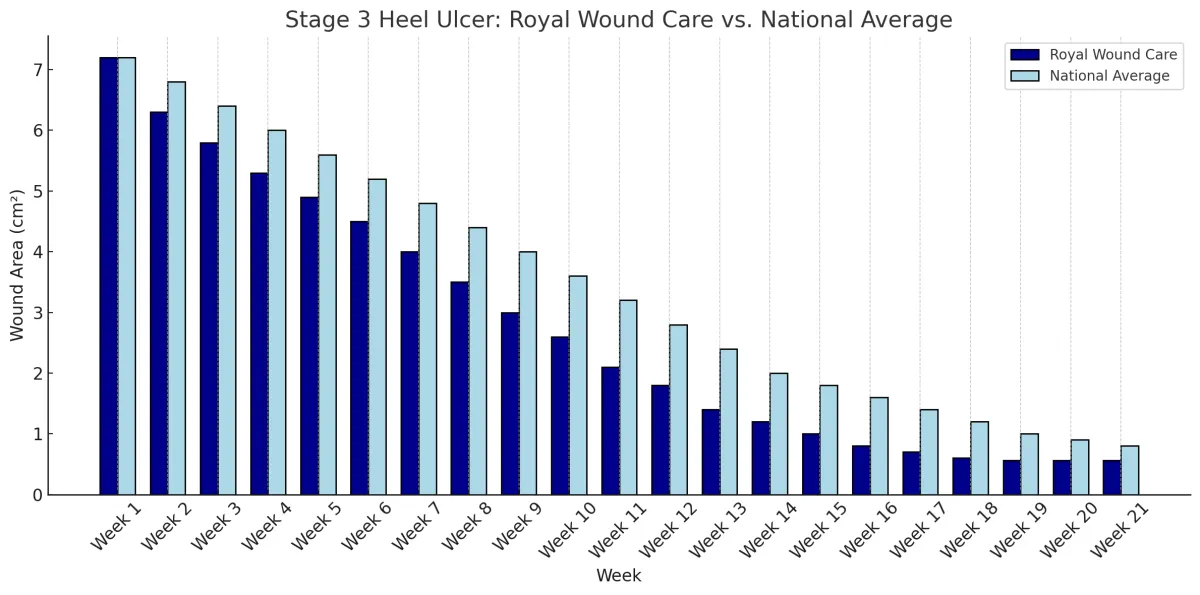Nursing Home Wound Care Management: Partnering with Royal Wound Care
From Diagnosis to Recovery—We’re With You Every Step of the Way
At every stage of the healing process—from initial diagnosis to full recovery—our dedicated wound care team delivers expert, compassionate support tailored to the needs of skilled nursing facility (SNF) residents. We specialize in providing a seamless, patient-centered continuum of care that ensures consistent, high-quality treatment throughout each resident’s journey to healing.
Our Skilled Nursing services include:
Skilled Observation and Assessment
Regular monitoring and evaluation of your health to ensure proper care and early detection of changes.
Diabetic Management
Expert guidance in managing diabetes, including blood sugar monitoring and insulin management.
Wound Care
Specialized care for wound healing, including dressing changes and infection prevention.
Medication Supervision
Assistance in managing medications and ensuring proper dosages and schedules.
Intravenous Therapy
Administering IV treatments such as hydration and antibiotics safely at home.
Total Parenteral Nutrition (TPN)
Providing nutritional support for patients unable to eat or absorb food normally.
Pain Management
Developing personalized pain control strategies to enhance comfort and quality of life.
Respiratory Treatment
Managing and supporting respiratory conditions with appropriate therapies.Incontinence Care
Helping with personal care and providing strategies for managing incontinence.
Catheter and Ostomy Care
Expert care for catheter and ostomy patients to ensure comfort and proper function.
Patient and Family Health Education
Offering training and guidance to ensure patients and families are equipped to manage ongoing care needs.
For questions regarding our skilled nursing facilities, please contact 818–660–2977


Clinical Excellence,Faster Healing, Better Outcomes: How Royal Wound Care Outperforms National Benchmarks
At Royal Wound Care, we deliver results that consistently outperform the national average. Our advanced healing process combines evidence-based treatments, personalized care plans, and direct physician oversight to ensure optimal outcomes. Unlike many clinics, every patient is managed by a board-certified wound care physician who evaluates their condition and customizes treatment from day one.
Our venous ulcer graph highlights our success in treating one of the most challenging chronic wounds. Venous ulcers are often slow to heal and prone to recurrence, but at Royal Wound Care, we address not only the wound itself but also its underlying causes. Through vascular assessments, compression therapy, advanced grafts, and customized treatment protocols, our patients consistently heal faster than those receiving standard care elsewhere. This comprehensive, physician-led approach results in better long-term outcomes and fewer hospitalizations.
Our Stage 3 heel ulcer graph demonstrates how our approach leads to significantly faster healing compared to the national average. While traditional care results in gradual wound size reduction over several months, patients treated at Royal Wound Care experience more rapid progress through targeted therapies, aggressive infection control, and ongoing physician-directed adjustments to their care plan. Our proactive methods allow us to close even complex wounds weeks earlier than national trends, improving patient mobility, reducing pain, and preventing further complications.
For more expert tips, insights, and updates on wound care, check out our blog.

Avoiding Common Wound Care Mistakes: Expert Advice
Wound healing is a delicate process—and when handled improperly, even a minor wound can lead to serious complications like infection, delayed healing, or chronic non-healing wounds. At Royal Wound Care, we’ve treated thousands of patients whose recovery was delayed due to avoidable errors in wound management.
Whether you're a patient, caregiver, or healthcare provider, understanding what not to do is just as critical as knowing the best practices in patient care. Here are the top five wound care mistakes to avoid—and what to do instead.
Common Mistakes in Wound Care
Advanced Wound Healing
Delaying Medical Attention for Non-Healing Wounds
One of the most common and costly mistakes people make is assuming that all wounds will heal on their own with time. While some minor cuts and scrapes do improve naturally, others can silently transition into chronic wounds without obvious warning. If a wound hasn’t shown noticeable signs of healing—or has worsened—within two weeks, or hasn’t fully closed after six weeks, it’s no longer considered acute. At that point, it's classified as a chronic wound, which requires advanced medical evaluation and targeted treatment. Delaying care can lead to further tissue damage, infection, or long-term complications. At Royal Wound Care, we specialize in identifying and treating chronic wounds early—helping patients get back on the path to recovery before things escalate.
Expert Tip: Early intervention improves outcomes. Royal Wound Care specializes in chronic wound management using state-of-the-art therapies tailored to your unique healing needs.

Using the Wrong Wound Dressings
Not all wounds are the same—and neither are the dressings used to treat them. Selecting the wrong type of wound dressing can do more harm than good, potentially causing skin maceration, trapping bacteria, or drying out the wound bed, all of which can slow healing or lead to infection. In some cases, improper dressing can even encourage premature scab formation, which may interfere with healthy tissue regeneration. Each wound requires a tailored approach based on factors like depth, drainage, location, and underlying conditions. At Royal Wound Care, our specialists carefully assess every wound to choose the optimal dressing solution—ensuring the right balance of moisture, protection, and support for faster, complication-free healing.
Avoid: Cotton gauze or non-sterile bandages for open wounds
Use Instead: Moisture-retentive, antimicrobial, or collagen-infused dressings, as prescribed by a wound care specialist
Pro Insight: Our clinicians at Royal Wound Care assess each wound to select the optimal dressing for faster healing and fewer complications.
Ignoring the Role of Nutrition
Wound healing is a metabolically demanding process that requires a steady supply of essential nutrients to support tissue repair and immune defense. When the body lacks key nutrients—particularly protein, zinc, and vitamin C—the healing process can slow dramatically. Protein is vital for cell regeneration and collagen formation, zinc supports immune response and cellular repair, and vitamin C is crucial for collagen synthesis and fighting infection. Without proper nutritional support, wounds may remain open longer, increasing the risk of infection and complications. At Royal Wound Care, we take a holistic approach by addressing not just the wound itself, but also the underlying nutritional needs that are critical for complete, efficient healing.
What to Do: Adopt a wound-healing diet rich in lean proteins, leafy greens, citrus fruits, and fortified supplements. We offer nutrition consultations as part of our holistic care plans.
Failing to Recognize Signs of Infection
Symptoms like increased redness, swelling, warmth, persistent pain, or a foul odor coming from the wound should never be overlooked. These are often early indicators of infection and require immediate medical attention. Ignoring these warning signs can allow the infection to spread, potentially leading to serious complications such as cellulitis, sepsis, or even limb-threatening conditions. Timely evaluation by a wound care specialist can help prevent escalation, ensure proper treatment, and protect your overall health. At Royal Wound Care, we prioritize early detection and rapid intervention to keep minor issues from becoming major health risks.
Quick Action: Call Royal Wound Care immediately if you notice any of these warning signs. We provide prompt evaluation and antimicrobial therapies to manage infections effectively.

Inconsistent or Improper Wound Care at Home
Inconsistent or improper wound care at home is one of the leading causes of delayed healing and preventable complications. Skipping regular dressing changes, using unsterile tools, or failing to follow your provider’s post-care instructions can significantly hinder the body’s natural healing process. These small oversights often lead to infection, prolonged inflammation, or reopening of the wound—all of which can turn a manageable injury into a long-term health issue. That’s why professional guidance and consistency in at-home wound care are essential. At Royal Wound Care, we educate every patient on proper wound maintenance, provide clear take-home instructions, and offer follow-up support to ensure optimal healing between visits.
Best Practice: Follow your care plan to the letter, and attend all follow-ups. Our team ensures you’re fully educated and supported every step of the way.
Why Expert Wound Care Matters
When to See a Wound Care Specialist
Expert wound care plays a critical role in preventing complications and promoting faster, safer healing—especially when wounds don’t respond to basic at-home care. What may start as a minor injury can quickly become a serious health concern if left untreated, potentially leading to infections, hospitalization, or even limb loss in severe cases. That’s why it’s important to know when to seek professional help. If a wound hasn’t shown signs of improvement within 7–10 days, appears red or swollen, emits an unpleasant odor, or is associated with chronic conditions like diabetes or poor circulation, it’s time to consult a wound care specialist. At Royal Wound Care, we don’t just treat wounds—we transform lives. Our advanced treatments, personalized recovery plans, and compassionate approach help patients heal faster, reduce pain, and regain confidence throughout their recovery journey.

Book Your Appointment Today with Royal Wound Care
Even minor injuries can become serious if left untreated or improperly cared for. If you or a loved one is struggling with a wound that’s slow to heal, painful, or showing signs of infection, it’s time to take action. At Royal Wound Care, our specialized team is dedicated to providing advanced, compassionate wound management to help you recover faster and more completely.
Whether you're dealing with diabetic ulcers, surgical wounds, pressure sores, or chronic skin injuries, our expert clinicians use state-of-the-art techniques and personalized treatment plans to promote healing, prevent complications, and restore your peace of mind.
Advanced Wound Healing Therapies
Experienced, Certified Wound Care Specialists
Personalized Treatment Plans Tailored to You
Comfortable, Confidential, and Compassionate Care
Your health is too important to leave to chance. Let Royal Wound Care guide you toward a safe, confident recovery—because healing begins with the right support.
👉 Schedule your consultation today and take the first step toward complete wound healing and renewed confidence.
Frequently Asked Questions
What is the best way to clean a wound?
The easiest way to clean a wound is to rinse it gently with clean, running water or use a saline solution. You should follow your healthcare professional’s advice on effective pain management during this process. Do not use strong antiseptics like hydrogen peroxide because they can hurt the healing tissue. Dry the wound softly with a clean gauze pad. Then, put on the dressing that was prescribed.
How often should wound dressings be changed?
The number of times you change a wound dressing depends on the type of wound and how much drainage or discharge it has. Your healthcare professional will also give advice on this. Usually, dressings are changed every 1 to 3 days or whenever they get dirty or wet. During your point of care, your healthcare provider will tell you the best schedule for changing the dressing for your wound.
Can poor nutrition really affect my wound healing?
Yes, not eating well can really harm how your wounds heal. Key nutrients help your immune system and are necessary for repairing tissues, reducing inflammation. Good nutrition is important for wound care and has an impact on the healing process.
What are the signs of an infected wound?
The signs of infection in a wound can be redness, swelling, and warmth around it. You might also feel more pain, notice a foul odor, see drainage, or have a fever. If you have any of these signs of infection, it is important to get medical attention and possibly antibiotics right away.
When should I seek medical advice for a wound?
If you have a wound, it's important to see a doctor if it is deep, bleeding a lot, or doesn't stop bleeding after pressing on it for 10 minutes. Also, you should seek help if you see signs of infection or if you are worried about how serious the injury is or any possible complications. A healthcare professional can check the wound, assess the severity, create a treatment plan, and help you with any concerns you may have.
WEST HILLS
7230 Medical Center Dr. Suite 100
West Hills, CA 91307
(818)–660–2977
BEVERLY HILLS
9735 Wilshare Blvd #210B
Beverly Hills, CA 90212
(818)–660–2977
If you are interested in making an appointment, please click here to find a Wound Care Center near you.
Request an Appointment at a Royal Wound Care Facility near you.
Royal Wound Care is the expert in wound healing. Our board-certified wound care specialists are ready to help you begin your healing journey. Click the button below to request an appointment at a Wound Care Center near you—no referral needed
© 2025 Royal Wound Care, LLC. All rights reserved.
site by Growth Partners Marketing

